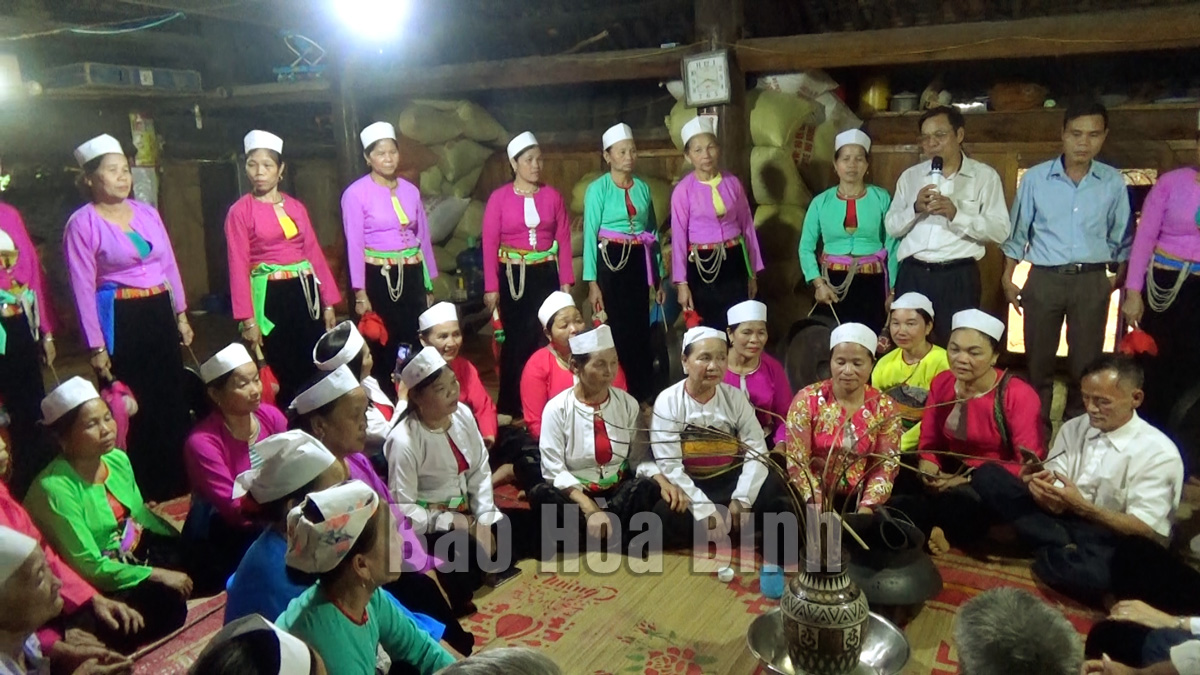
(HBO) - Identifying cultural heritage as a resource for socio-economic and cultural development, over recent years, Lac Son district has paid special attention to the preservation and promotion of cultural heritage values. Many temples and shrines have received investment to be embellished, many festivals reacted, and folk songs of the Muong ethnic minority group and Mo Muong preserved and promoted.

Lac Son district has established and maintained the
operation of folk singing clubs in order to preserve the cultural identity of
the Muong ethnic group.
Lac Son, which is a large area with a dense population, is
one of the four famous Muong regions (Bi, Vang, Thang, Dong) of Hoa Binh
province. With over 91% of the population belonging to the Muong ethnic group,
preserving the "Muong soul” and the Muong culture is always a concern for those
who are in charge of making decisions on socio-economic and cultural
development of Muong Vang. In order to raise the cultural heritage value, in
December 2021, the Lac Son district Party Committee issued Resolution No.
08-NQ/HU on "Preserving and promoting the Muong ethnic group’s cultural
identity in the district”, while the district People's Committee issued a
project on "Preserving and promoting the national cultural identity in Lac
Son district in the 2022 - 2025 period with a vision to 2030", along with
a plan to implement the project in August 2022.
Since 2020, the district has submitted to the competent
authority for recognition of three provincial-level historical and cultural
relic sites, including Bang, Khenh and Khoi communal houses; and invested in
building several monuments such as: Dinh Khoi, Coi and Khenh communal houses
and the relic site of Regiment 52 Tay Tien.
Nguyen The Hung, head of the Culture and Information Office
of Lac Son district, said that in the 2023 – 2025 period, the district
continues to propose recognising some other provincial-level relic sites,
upgrading two national-level archaeological relics of Trai hamlet cave in Tan
Lap commune and Vanh hamlet stone shelter in Yen Phu commune into special
national-level sites. It will propose investment in building a museum on "Hoa
Binh civilisation” in prehistoric times in Tan Lap commune and continue to
research and propose to build a Muong culture space in Vanh hamlet in order to
promote the value of cultural heritage in Muong Vang land./.
With an increasingly vibrant and widespread emulation movement aimed at building cultured residential areas and cultured families, Yen Thuy District has been making steady progress toward improving both the material and spiritual well-being of its people, while fostering a civilized, prosperous, beautiful, and progressive community.
Once lacking recreational spaces and community facilities, Residential Group 2 in Quynh Lam Ward (Hoa Binh City) has recently received attention for the construction of a new, spacious, and fully equipped cultural house. The project followed the model of state support combined with public contributions in both labor and funding.
The "All people unite to build cultural life" movement, which has been effectively integrated with Kim Boi district’s socio-economic development goals, is fostering a lively spirit of emulation across local residential areas, hamlets, villages, public agencies, and enterprises. In addition, through the initiative, traditional cultural values are being preserved and promoted, while community solidarity and mutual support in poverty reduction and economic development are being strengthened.
A working delegation of the Hoa Binh provincial People’s Committee led by its Permanent Vice Chairman Nguyen Van Toan on June 11 inspected the progress of a project to build the Mo Muong Cultural Heritage Conservation Space linked to tourism services in Hop Phong commune, Cao Phong district.
Born and growing in the heroic land of Muong Dong, Dinh Thi Kieu Dung, a resident in Bo town of Kim Boi district, in her childhood was nurtured by the sweet lullabies of her grandmother and mother. These melodies deeply imprinted on her soul, becoming an inseparable part of her love for her ethnic group's culture. For over 20 years, this love for her hometown has driven Dung to research, collect, and pass down the cultural values of the Muong people to future generations.
In the final days of May, the Ethnic Art Troupe of Hoa Binh Province organized performances to serve the people in remote, mountainous, and particularly disadvantaged areas within the province. These were not just ordinary artistic shows, but they were the meaningful journeys aimed at spreading cultural values, enhancing the spiritual life of the people and contributing to the preservation of ethnic minority cultural identities.



